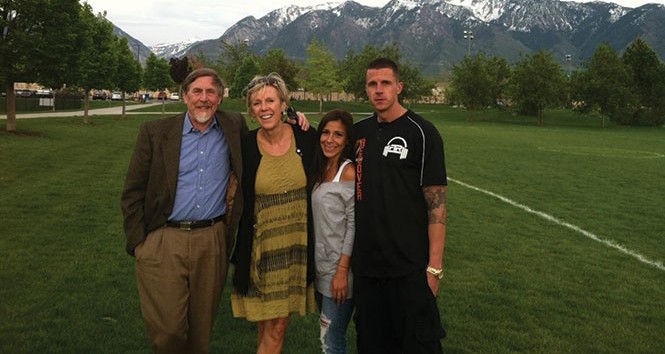Ian Acker & Lacey Garcia of Fit to Recover
Group promotes fitness and recovery
By Tiffany Frandsen @tiffany_mfWhile recovering from addiction, Ian Acker (pictured on far right, with parents Steve and Suzanne Acker, and Lacey Garcia) discovered that if he worked out before a meeting, he could focus better. He began using exercise to fill the void drug use left and recruited others recovering from addiction, creating Fit to Recover (Fit2Recover.org). His group started as three people exercising in Sugar House Park in 2013. By January 2015, it had grown to 70 people in a warehouse that local artists Sarah Kappos and Jarhett Jones and a group of seventh graders painted. In addition to promoting fitness, FTR has a recording studio, a creative writing group and a women's group, started by Lacey Garcia.
Why fitness and recovery?
Ian Acker: I'm ADHD and have a hard time sitting for long periods of time. I listen best after a workout. After I worked out, I was more vulnerable, able to talk about my feelings and more comfortable. The release of endorphins and dopamine from exercise allows me to be more vulnerable and break down those walls and insecurities. When you sweat with someone in a workout, and you get through something, it brings through a power that's greater than ourselves that opens up conversation.
And if you hate working out?
Lacey Garcia: Anybody is welcome, whether you come and exercise or not. [Boot camp] is a bunch of people on a Saturday morning who aren't hungover—they come out to be a part of something. There's something here for everyone. We have yoga, creative writing, the womens' group—if you don't love to work out, still come. It's a place to make yourself better.
Why the womens' group?
LG: As women, it's easy for us to take drugs and alcohol away and need to fill that void with men. I work in an alcohol and drug treatment center and I see it all the time. I didn't know how to make friends with women. I started to hang out with other women who had been sober longer than I had. That's when my own recovery took off and they taught me how to be not only a women in recovery, but a women—period. This is a place where women can come together. I have some women who aren't in recovery—everyone struggles with something.
Are there ever days you don't want to show up?
IA: There are plenty of times I want to give up. I want to bail. I've never run a nonprofit before in my life. We have a team that knows what they're doing, but the reason I don't give up is because what else would I be doing? Sitting in bed? Thinking about doing something else? It beats the alternative. Every time I get to help someone and someone says "thank you," it makes the past week worth it—even though it's hard.
Is there research to prove fitness helps recovery?
IA: We're hoping to pilot a research program and show hard facts that this helps people. [Acker's father,] is at the University of Utah, in contact with some of the research and development team there and during the fall, it would be nice to get some quantitative data on this place and who's staying and who's not. But again, it's 8 months in and we're just trying to lay the foundation.
Why the recording studio?
LG: The idea behind the recording studio is to pilot people's journeys and successes through their recovery. At 10 days sober, we ask them a list of questions, like, "where's your bank account," "how are you with your parents?" and "how are you with God or with your religion or your spirituality?" And then at 20 days we ask them the same set of questions, and then 30 days, same set of questions. By day 30, you see these people say, "I have 100 dollars in my bank account." "Now I found nature is my higher power and I talk to my mom twice a day. We burn it on a CD and say, "it may feel like you haven't come far, but look how far you've come in 30 days." It's tangible evidence.
Are there ever days you don't want to show up?
LG: At the end of the day, he and I are in recovery too. For me, I have to make sure I take care of my own recovery and my own needs. I do things outside of here for my own recovery, whether it's work with a sponsee, or different things like that. Not showing up is really not an option. We've worked too hard and come too far to give up. But there are hard days.
Once you're in the group, are you in for life?
LG: Recovery is something you have to work on all the time. A lot of people don't stay sober, unfortunately. A lot of people come in and then we don't see them again; it's that they're probably not still sober. I think the majority of people that come here keep coming back, and that's why they're still sober. They're consistent and keep showing up. I have women in my womens' group who are nine-years sober, and those are the things you have to keep doing to maintain sobriety. You have to keep showing up.
More by Tiffany Frandsen
-
Violet Chachki
The drag superstar brings her music (and larger-than-life persona) to Saltytown.
- Dec 2, 2015
-
Girlpool
Whatever "it" is, teenage indie-punk duo Girlpool dwells there
- Oct 14, 2015
-
Karrie Galloway of Planned Parenthood Association of Utah
President/CEO confident new funding will be found
- Sep 16, 2015
- More »




